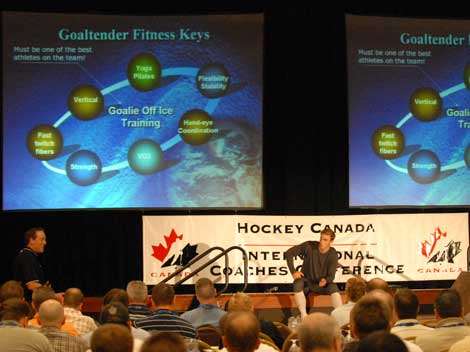Benefits and Rationale for U11 Hockey
Learn about the ideas and research behind minor hockey for 9 and 10 year olds
Dr. Stephen Norris has consulted with Hockey Canada in the areas of player development and performance programming for a number of years. He was one of the founding members and contributors to the ‘Canadian Sport for Life’ movement focusing on athlete/participant development. Dr. Norris contributed to Hockey Canada in the design of the Long-Term Player Development Model and Player Pathways.
In each area outlined below, rationale has been provided and has been supplemented by Dr. Norris.
Player evaluation/selection/tryouts cannot be scheduled prior to the start of the school year.
- Give local hockey associations and parents back the summer – the season does not need to start this early only to be finished at the end of January or early in February (start later and end later).
- Give local hockey associations a chance to get organized and begin planning.
- The start of school year can be very stressful for young players, and they do not need hockey evaluations starting at the same time as the school year.
The notion of evaluations taking place weeks, if not months, in advance of the actual season for this age group makes very little sense due to the realities of child development during these periods.
The summer months are a time where youngsters not only consolidate previous experiences, but also advance their competency due to aspects such as recovery from earlier specificity, demonstrate adaptation of all previous experiences to new situations and activities over the summer months, and reveal growth and development opportunities that occur naturally – physical, psychological, cognitive, motor development, social, etc.
Everyone should understand that the return-to-school period (both the couple of weeks before, the week of and the ‘wash-in period’ until the student is settled back into the routine) is an extremely stressful period for the student.
Minimum of four practices and/or skill sessions prior to formal player evaluation/ selection/tryouts.
- A player’s first experience in the new hockey season should not be a formal evaluation – this gives all players the opportunity to get back on the ice in a ‘player-friendly’ scenario.
- Level the playing field; not all players have a chance to go to hockey schools or prep camps prior to the start of the season.
- Provide local hockey associations the opportunity to run their own prep camp instead of members spending money outside the association.
There is a substantial benefit for children to have the opportunity to participate in four ice sessions prior to formal selection or evaluation. Players feel more relaxed and are able to perform at a higher level, compared to being evaluated in their first time back on the ice. By providing these opportunities, players are placed in a situation where stress has been mitigated and they are able to showcase their ability.
Player evaluation/selection/tryouts must be a minimum of three formal sessions. Recommendation is one skills session, one small-area games session and one game.
- Players need a chance to be evaluated – standardization means transparency, fairness and consistency.
- Provide coaches with the foundation for a solid and quantifiable evaluation.
This follows the previous point of providing ALL players with the opportunity to re-engage with hockey. For example, it would be unacceptable for a school in the first week of September to give children an exam they must pass, or else the child would not be permitted to take that subject during the school year. This would be unacceptable to parents, yet this is the impact of evaluations early in the process before anything is taught.
Development time following team selection and prior to the start of the regular season.
- It is very important to provide coaches with the opportunity to develop and improve their players’ skills prior to organized games.
- The progression should be skills before tactics and tactics before systems.
- This will eliminate or reduce the focus on and/or pressure to win.
Professional and/or knowledgeable individuals wishing to provide positive developmental experiences for children or youth should reinforce the need for an instructional or practice component prior to the start of the season. With the implementation of this policy, we are moving forward to not only accept, but welcome development opportunities for the betterment of players.
Playoffs must be tournament-style format versus elimination rounds.
- All players deserve the same chance to play to the end of the year.
- More teams and more players playing longer into the season.
- Allows more rest and recovery within the season and the regular season schedule can be spread out.
- Greater opportunity for more players to participate in different activities.
Teams often finish their regular season at the end of January or beginning of February to accommodate a playoff scenario that mimics what professional teams or semi-professional age-group development teams do.
It is important to remember that minor hockey is designed for children and youth who are developing and wanting to play hockey for as long as possible each season. After the first round of this playoff format (often the first week), 50% of the teams are no longer playing and with each successive round, 50% of the remaining teams get knocked out. This means that weeks before the end of the Canadian winter, we no longer have kids playing hockey, at least in terms of the original connection.
In an elimination-style playoff structure, teams look for tournaments and exhibition games to keep playing at least until the end of March. Unintentional consequences are increased costs to each participant due to travel, accommodation, food, entry fees, the associated costs of tournaments and even lost wages/salaries for parents. It is recommended that associations look at competition structures that keep their participants playing until as late in the season as possible.


 HOCKEY CANADA
HOCKEY CANADA


